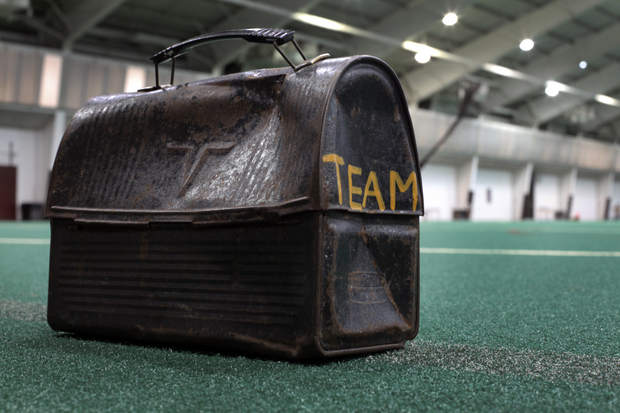(Source: Creative Commons)
My grandson won the Lunch Bucket Award on his high school football team and his father’s reaction to it and mine surprised me.
The Lunch Bucket Award is given to the player making the greatest contribution during practice in the week leading up to the Friday night game. My grandson is a third-string running back on a state-ranked top-20 team, and he seldom gets into the game. Yet he was proud to carry the rusty lunch bucket to all his classes for the week after the game. His father, my son, was dismissive, calling it “the tackling dummy award” and suggesting it should have been humiliating to lug an old-time lunch bucket around—signaling to all his classmates that he was not first-team.
|
“Unskilled work” almost always requires skills to do a good job. And it requires daily self-sacrifice that is hard, very hard, to do day in and day out. Even so, such work is actively disrespected by our mainstream culture.
|
My grandson is an exuberant, talkative, sort-of-flashy 16-year-old whom teachers and coaches have euphemistically designated as “very coachable.” School has never come easy to him, but he works hard and brings home good grades and is diligently prepping for his ACT test so he can “get into a really good college.” As an athlete, he has some natural ability, but his main assets are self-discipline, the ability to learn and improve, and his willingness to work hard.
His job as a practice-squad running back is to learn the offensive scheme of each week’s opponent, and then run it as well as he can to prepare the first-team defense for what they will face Friday night. It is a highly intellectual assignment learning new plays each week, followed by running hard and being tackled by the team’s hardest hitting players. It is also highly honorable work for which the “dummy” part of “tackling dummy” is clearly inappropriate. But even more honorable is the grit it takes to do it at all, let alone to do it well when nobody is watching (except, of course, his teammates and coaches, who gave him an award for it).
Sports iconography is full of working-class imagery about “blue-collar” players who “simply show up for work and do a good job,” and who get little or no recognition for what they do. The old-time barn-shaped lunch bucket is a powerful symbol of this steady, reliable, just doing-your-part work ethic—especially when your part is dirty, distasteful, or dangerous, or maybe just monotonous in a way that middle-class people call “mind-numbing” or “soul-deadening.”
Most work that needs to be done in our society is like this. Even though what is often called “unskilled work” almost always requires a wide variety of skills to actually do a good job, these jobs also require a daily kind of self-sacrifice that is hard, very hard, to do day in and day out—and that is actively disrespected in our mainstream culture with its celebration of the best and the brightest, the entrepreneurs and the innovators. Sports is just about the only place in America that ever recognizes and celebrates the value of those who “simply show up every day and do a good job” at the kind of work upon which everything else depends.
My wife and I were raised in families that carried those lunch buckets to those jobs, and though once upon a time we did, too, for a while, we’re both glad we never had to find out whether we could have summoned the everyday courage, the true grit it takes to do it for a lifetime.
We were well on our way to becoming thoroughly middle class by the time our son was our grandson’s age, but even as well-educated grownups we didn’t know how to properly raise middle-class children— in what sociologist Annette Lareau calls “concerted cultivation.”
Our son knows that and, while he’s very forgiving of us, he’s determined to make sure his children have the education and skills they’ll need to avoid lunch-bucket jobs and to cultivate that never-settle-for-second-best achievement-orientation that so many middle-class people think is essential to living a good life. He has a middle-class job at which he earns a very good living, but just as our fathers did, he hates the work itself and the kind of work he does. He wants better than that for his kids, and for him the Lunch Bucket Award somehow challenges that aspiration.
Our grandson needs no help from us. When asked if he was demoralized at not getting much playing time, he said, “No, I’m a big part of this team. On the practice squad, I help the first team get better—and that puts me out there on the field even when I’m not actually out there.”
| This article was originally published by Working-Class Perspectives and appears here by way of special arrangement. |
I got emotional trying to congratulate him for his Lunch Bucket Award by referencing my grandfather (his great-great grandfather) who, as he knows from family legend, walked out of a steel mill in 1916 “on his own” right after losing both arms in a rolling mill. I said something like, “That’s an award for character, buddy, and that will be with you long after you can’t juke and jive anymore.” He said, “Huh?” Followed by a polite, though possibly comprehending, “Thanks, Pap.”
I understand that sky-high, you-can-do-anything aspirations can spur young people onward and upward in healthy ways. I also understand why parents often fear low expectations for their kids. But facing realistic aspirations and expectations for ourselves and our children is a tricky business, and it will not help to believe that “you can never aim too high.”
Most of us are going to need some lunch-bucket mentality for some or all of our lives. We’ll need the steady will to do what we have to do to earn a living and to have the personal integrity to do a good job even when we don’t feel like it and nobody is watching.
Jack Metzgar is a core member of the Chicago Center for Working-Class Studies.





0 Comments